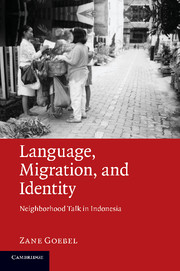Book contents
- Frontmatter
- Contents
- Figures
- Diagrams
- Maps
- Tables
- Extracts
- Preface
- Conventions
- 1 Introduction
- 2 Long-term Processes of Enregisterment
- 3 Enregistering Local Practices and Local Spaces
- 4 Linguistic Signs, Alternation, Crossing, and Adequation
- 5 Women, Narratives, Identity, and Expectations in Ward 8
- 6 Learning to Become a Good Ward Member
- 7 Emerging Identities in a Monthly Ward 8 Male Meeting
- 8 Chineseness as Deviance
- 9 Language Ideologies and Practice in Ward 5
- 10 Conclusions
- Notes
- References
- Index
5 - Women, Narratives, Identity, and Expectations in Ward 8
Published online by Cambridge University Press: 04 August 2010
- Frontmatter
- Contents
- Figures
- Diagrams
- Maps
- Tables
- Extracts
- Preface
- Conventions
- 1 Introduction
- 2 Long-term Processes of Enregisterment
- 3 Enregistering Local Practices and Local Spaces
- 4 Linguistic Signs, Alternation, Crossing, and Adequation
- 5 Women, Narratives, Identity, and Expectations in Ward 8
- 6 Learning to Become a Good Ward Member
- 7 Emerging Identities in a Monthly Ward 8 Male Meeting
- 8 Chineseness as Deviance
- 9 Language Ideologies and Practice in Ward 5
- 10 Conclusions
- Notes
- References
- Index
Summary
Introduction
While identity, whether this be individual or group, has been one of the enduring topics of discussion within the humanities and social sciences (e.g. Barth, 1969; Gumperz, 1982c; Le Page & Tabouret-Keller, 1985; Gudykunst, 1988), increased levels of migration and talk-based approaches to human interaction have problematized earlier notions of identity (e.g. Appadurai, 1996; Baumann, 1996; Hall, 1996; Werbner, 1997; Antaki & Widdicombe, 1998b; Tsuda, 1999; Brettell, 2003; Bucholtz & Hall, 2004a; Wortham, 2006). One common thread in some of this work relates to how identity is discursively constructed in contexts characterized by heterogeneity and transience. This chapter looks at one such context by focusing on face-to-face interactions among the women of Ward 8 during a routine monthly ward meeting. In particular, it explores how these women go about narrating identities and how this relates to perduring signs of identity.
After relating work on semiotic registers to talk and narrative (Section 5.1), I go on to focus on how talk in a female meeting in Ward 8 creates categories of personhood and social relations (Section 5.2). In Section 5.3 I go on to show how such categories become indexed to deviance through further talk about non-present persons. In following this talk, Section 5.4 examines how categories of personhood are linked to behavior while simultaneously constructing expectations for social conduct within this ward.
- Type
- Chapter
- Information
- Language, Migration, and IdentityNeighborhood Talk in Indonesia, pp. 76 - 108Publisher: Cambridge University PressPrint publication year: 2010



